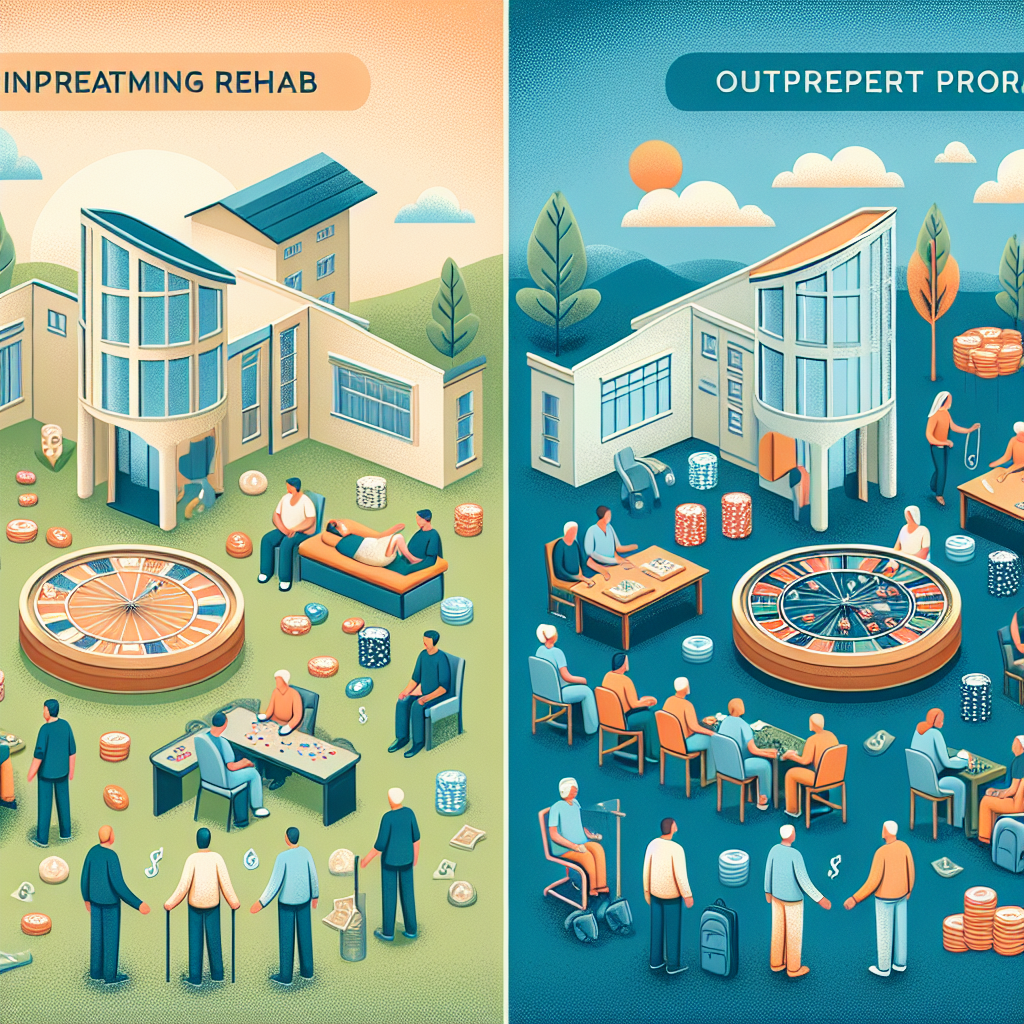-
Table of Contents

“Intensive Healing, Structured Support: The Distinct Advantage of Inpatient Gambling Rehab Over Outpatient Programs.”
Introduction
Inpatient gambling rehab and outpatient programs offer distinct approaches to treating gambling addiction, each with unique benefits and structures tailored to different needs. Inpatient rehab involves a residential stay at a treatment facility, providing an immersive environment where individuals receive round-the-clock care, intensive therapy, and a structured schedule designed to address the root causes of their addiction. This setting minimizes external distractions and temptations, fostering a focused recovery process. Conversely, outpatient programs allow individuals to live at home while attending scheduled treatment sessions. This flexibility enables them to maintain work, family, and social responsibilities, making it a viable option for those with less severe addictions or strong support systems. Outpatient care typically includes counseling, group therapy, and educational sessions, offering a less intensive but still effective treatment pathway. Understanding these differences is crucial for selecting the most appropriate and effective treatment plan for individuals struggling with gambling addiction.
Key Differences Between Inpatient and Outpatient Gambling Rehab Programs
When it comes to overcoming gambling addiction, choosing the right rehabilitation program is crucial. Inpatient and outpatient gambling rehab programs offer distinct approaches, each with its own set of benefits and challenges. Understanding these key differences can help individuals make informed decisions about their recovery journey.
Inpatient gambling rehab programs, often referred to as residential treatment, require individuals to live at the treatment facility for a specified period. This immersive environment provides a structured and supportive setting, which can be particularly beneficial for those with severe gambling addictions. One of the primary advantages of inpatient rehab is the ability to remove individuals from their everyday environments, which are often filled with triggers and temptations. By doing so, inpatient programs create a safe space where individuals can focus entirely on their recovery without external distractions.
In contrast, outpatient gambling rehab programs allow individuals to live at home while attending treatment sessions. This flexibility can be advantageous for those who have work, family, or other commitments that they cannot put on hold. Outpatient programs typically involve regular therapy sessions, group meetings, and educational workshops. While this approach offers more freedom, it also requires a higher level of self-discipline and motivation, as individuals must navigate their daily lives while adhering to their treatment plans.
Another key difference between inpatient and outpatient programs lies in the intensity of care provided. Inpatient rehab offers 24/7 support from medical professionals, therapists, and counselors. This constant access to care ensures that individuals receive immediate assistance during moments of crisis or temptation. Additionally, the structured daily routines in inpatient programs help individuals develop healthy habits and coping mechanisms, which are essential for long-term recovery.
On the other hand, outpatient programs provide a more flexible schedule, allowing individuals to attend therapy sessions and support groups at times that fit their personal schedules. While this can be convenient, it also means that individuals must be proactive in seeking help when needed. The level of support in outpatient programs may vary, but it generally involves regular check-ins with therapists and participation in group therapy sessions. This approach can be effective for those with milder addictions or those who have already completed an inpatient program and are transitioning back to everyday life.
The social aspect of rehabilitation also differs between the two types of programs. Inpatient rehab fosters a sense of community among residents, as they live and recover together. This camaraderie can be incredibly motivating, as individuals share their experiences and support one another through the challenges of recovery. The bonds formed in inpatient rehab often extend beyond the treatment period, providing a lasting support network.
Conversely, outpatient programs rely on the individual’s existing support system, such as family and friends, while also encouraging participation in local support groups. This approach can help individuals integrate their recovery into their daily lives and build a strong foundation for long-term sobriety. However, it also requires a robust external support system, which may not be available to everyone.
Ultimately, the choice between inpatient and outpatient gambling rehab programs depends on the individual’s specific needs, circumstances, and the severity of their addiction. Both approaches have their unique advantages and can be highly effective when tailored to the individual’s situation. By understanding the key differences between these programs, individuals can make informed decisions that set them on the path to a successful and lasting recovery.
Benefits of Inpatient Gambling Rehab Over Outpatient Treatment
In the journey toward overcoming gambling addiction, choosing the right treatment program is crucial. Inpatient gambling rehab offers a unique set of benefits that often make it a more effective option compared to outpatient programs. One of the most significant advantages of inpatient rehab is the immersive environment it provides. By residing in a dedicated facility, individuals are removed from the triggers and temptations of their everyday lives. This separation from the outside world allows them to focus entirely on their recovery without the distractions and pressures that might otherwise lead to relapse.
Moreover, inpatient rehab offers a structured routine that is essential for those struggling with gambling addiction. The daily schedule is meticulously planned, incorporating therapy sessions, group activities, and personal time for reflection. This structure helps individuals develop a sense of discipline and responsibility, which are critical components of long-term recovery. In contrast, outpatient programs often lack this level of organization, leaving individuals to manage their time and responsibilities, which can be overwhelming and counterproductive.
Another key benefit of inpatient rehab is the access to a multidisciplinary team of professionals. These facilities typically employ a range of specialists, including psychologists, counselors, medical doctors, and nutritionists, all working together to provide comprehensive care. This holistic approach ensures that all aspects of an individual’s well-being are addressed, from mental health to physical health and even social skills. Outpatient programs, while beneficial, may not offer the same level of integrated care, as individuals often have to seek out various specialists on their own.
Furthermore, the sense of community and support found in inpatient rehab is unparalleled. Living alongside others who are facing similar challenges fosters a sense of camaraderie and mutual understanding. Group therapy sessions and communal living arrangements create an environment where individuals can share their experiences, offer support, and learn from one another. This sense of belonging can be incredibly motivating and reassuring, helping individuals realize that they are not alone in their struggle. On the other hand, outpatient programs may lack this level of peer support, as individuals typically attend sessions and then return to their regular lives, often feeling isolated in their journey.
Additionally, inpatient rehab provides immediate access to crisis intervention and medical care. In the event of a severe emotional or physical reaction, professionals are on hand to provide immediate assistance. This level of care can be life-saving and is not typically available in outpatient settings, where individuals may have to wait for appointments or seek emergency care on their own.
Lastly, the duration and intensity of inpatient rehab often lead to more profound and lasting changes. The extended time spent in a controlled environment allows for deeper exploration of the underlying issues contributing to the addiction. Intensive therapy sessions, combined with continuous support, enable individuals to develop coping strategies and life skills that are essential for maintaining sobriety. While outpatient programs offer flexibility and can be effective, they may not provide the same depth of treatment, as the limited time and external distractions can hinder progress.
In conclusion, while both inpatient and outpatient programs have their merits, the benefits of inpatient gambling rehab are particularly compelling. The immersive environment, structured routine, multidisciplinary care, sense of community, immediate access to medical care, and the depth of treatment all contribute to a more effective and transformative recovery experience. For those seeking to break free from the grip of gambling addiction, inpatient rehab offers a comprehensive and supportive path toward a healthier, more fulfilling life.
Q&A
1. Inpatient gambling rehab provides a structured, immersive environment where individuals live at the facility and receive 24/7 support and supervision, while outpatient programs allow individuals to live at home and attend scheduled treatment sessions.
2. Inpatient programs often offer a more intensive level of care with a comprehensive range of therapies and activities designed to address the root causes of gambling addiction, whereas outpatient programs typically provide more flexible, less intensive treatment options that can be scheduled around daily responsibilities.
Conclusion
Inpatient gambling rehab differs from outpatient programs primarily in the level of intensity and structure provided. Inpatient rehab offers a controlled environment where individuals reside at the facility, allowing for 24/7 supervision, immediate access to medical and psychological support, and a structured daily schedule focused on recovery. This setting minimizes external triggers and distractions, fostering a concentrated effort on overcoming addiction. Conversely, outpatient programs offer more flexibility, allowing individuals to live at home and maintain daily responsibilities while attending scheduled therapy sessions. This approach is less intensive and relies heavily on the individual’s ability to manage their environment and triggers independently. Ultimately, the choice between inpatient and outpatient rehab depends on the severity of the addiction, the individual’s personal circumstances, and their support system.



